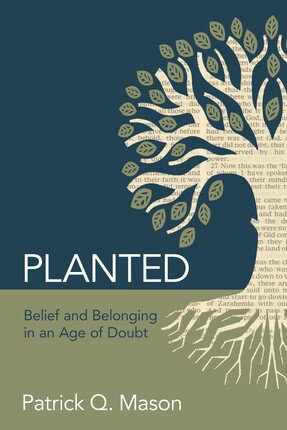Two years ago I wrote an article titled “Why People Leave The Church and Never Come Back.” Since then, the article has been read nearly a million times. Rarely does a week go by without someone reaching out to say, “Hey Nate, I don’t know you, but I read your article. Can we talk?”
These people tend to fall into two groups.
The first group consists of members of the Church who are silently suffering as they wrestle with their faith. Despite their own anguish, they resist sharing their struggles with friends and family. They fear it will cause those they love pain, that it might stir up unnecessary stress and drama within their family, or they might experience extreme shame, disappointment and loneliness as they are slowly and uncomfortably cut out of the lives of the people they love so much.
► You'll also like: Belief and Doubt Video Series
The other group of people who reaches out to me after reading the article is members of the Church who have loved ones who have left or are obviously distancing themselves from the Church.
“What can I do to help?” they ask?
My answer for a long time was, “Just love them.” And I now realize how unhelpful this advice is. Often members of the Church push those going through a faith transition even further away by acting out of what they believe to be love. So, I thought it was high time I get a little more specific and practical with my advice.
So here are two specific things you can do if you have a loved one who is doubting, or considering leaving the Church:
1. Take responsibility for your emotions.
When a loved one shares with you that they are struggling with their faith, or no longer a believer, it’s common to feel a rush of emotions. Anger, confusion, betrayal, fear, guilt and disappointment are common. Parents, leaders, and friends might consider themselves to be failures and wonder where they went wrong.
It’s easy to believe that if you could just fix the person’s faith—resolve their doubts, remind them of a time when they felt the Spirit, or help them repent—those overwhelming negative emotions you’re feeling would just go away.
And here’s where many people make a big mistake. They believe that these emotions are caused by a specific event, like their loved one admitting they’re leaving the Church. But research shows that it’s not the event that upsets us. It’s our interpretation of the event and the thoughts we have about it that creates the emotions.
For example, let’s say “Gary” approaches his mother, “Sue,” and says, “Mom, I’m not going to church anymore. I haven’t gone for a while. I am really struggling to feel any connection to God, and I just don’t believe the Church is true anymore.”
Gary might have secretly felt this way for months, or even years without it affecting the relationship he has with his mom. But the moment Sue heard those words, her brain started racing. “What does this mean? If he leaves the Church, he won’t be in heaven with our family! If he forsakes God, he’ll miss out on so many blessings! What if this is my fault? What if I didn’t do my job as a mother to teach him how to have enough faith? Am I responsible for this? Will his wife divorce him? What will happen to his poor kids? Will he let them get baptized? What will grandma think? How will his siblings react when he can’t go to their temple wedding?”
These are big, scary thoughts! And it’s important to understand that it’s the thoughts you think about an event like this that stir up the emotions, not the event itself.
It’s a dangerous temptation for Sue to avoid taking responsibility for her thoughts and emotions, and instead blame Gary. “If he just would have said his prayers and read his scriptures more, we wouldn’t be dealing with this family drama.”
And when Sue blames Gary, she tries to fix the problem by fixing Gary.
She tries to trick or manipulate him into feeling the Spirit by asking him to bless the food when he’s over for family dinner.
She encourages him to pray and read his scriptures when he’s going through hard times.
When he asks her to babysit his kids while he’s on a business trip, Sue takes them to Primary in the hopes that the kids will beg to go back to church when he’s back in town.
She tells him she’s putting his name on the prayer roll in the temple.
She sends the missionaries his address when he moves to a new home hoping that they can rekindle his faith.
She believes these things are done out of love, but really they’re an effort to mitigate her anxiety. She believes she just needs one of these things to work to get Gary to feel the Spirit and go back to church. Then, all the guilt, anger, fear, sadness, and disappointment go away and heal her family.
This puts tons of pressure on Gary. The more time he spends around his mom, the more he feels responsible for her misery and sadness. Now he feels guilt on top of everything else he’s struggling with, and he starts to distance himself from the family because he knows his presence only brings them pain.
The strategy simply does not work.
The reality is that Sue has no power over Gary’s choices. So, she can either live in misery, hoping that he changes his behavior so she will feel better, or she can examine and confront her own thoughts about Gary’s choice to leave that cause her so much fear, sadness, and pain.
► You'll also like: 6 Tips for Parents of Adult Children Who Don't Believe in the Church
2. Give empathy.
A few weeks ago, my wife and I interviewed Danelle and Tyler Beckstrand on the Mormon Marriages podcast. Danelle and Tyler want nothing more than to be parents—and they have been struggling with infertility for the entire seven years they’ve been married.
Their story is full of a mix of sadness and hope, and disappointment and faith. During that interview, one thing stood out to me. The pain and sadness Danelle and Tyler felt as they struggled with infertility was magnified by their loneliness.
“Nobody really talks about infertility,” they said.
But then Danelle started a blog to chronicle their journey. They started to build a community around them. The support and empathy the Beckstrands have felt from loved ones and complete strangers as they have shared their heartbreaks has helped them to keep moving forward.
What I realized after this interview is that—other than the occasional hushed conversation behind closed doors—there is no community within the Church where those who are struggling and doubting can experience empathy. Just like infertility, we don’t really like to talk about doubts. It makes us anxious and uncomfortable. (Which is ironic, because doubt is essential to faith.)
► You'll also like: How Doubt Can Actually Strengthen Your Faith
But outside of the Church, it’s a completely different story. There are plenty of communities full of people who have left the Church. They welcome those who are doubting with open arms. They listen to them express their doubts and complaints without judgment. They identify with them and empathize with them. They make them feel welcome.
I strongly believe that those who are struggling with their faith will continue to leave the Church en masse until we can start to create a culture and a community that embraces people wherever they are on their faith journey.
The best way to do this is to start with yourself. Reach out to the people you’re close to and tell them that your door is always open. And when they open up to you, breathe. Instead of trying to fix things, try to put yourself in their shoes.
Learn to calmly hold on to your testimony while you feel the discomfort of hearing someone express their frustration with a local leader or their concerns about Church history.
Showing empathy doesn’t mean you have to agree with the person you’re listening to. It just means you have to try to understand what their experience must feel like.
As you expand your capacity to show empathy, you will begin to create a space in your life, your community, and your congregation for everyone to feel welcome and accepted—not just those who fit the mold. You’ll create a sense of love, friendship, and unity that cannot be rivaled.
What’s next?
This article barely scratches the surface of the conversations we could be having. My hope is that it starts a dialogue. That it causes you to consider how you’re showing up for the people you love most.
Are you able to manage your thoughts and emotions in a way that fosters connection, closeness, and conversation? Or do you play the victim, blame, and make other people responsible for your emotions while allowing those emotions to rule you?
As we grow and mature as a church—as we learn to collectively sit in the discomfort of doubt and create more space for those to struggle to feel of our love and acceptance—we will see ourselves begin to embody our Savior, who urged us to mourn with those who mourn and comfort those who stand in need of comfort.
Nate Bagley is the co-host of the Mormon Marriages podcast with his wife, Angilyn. He's a TEDx speaker and a member of the Utah Marriage Commission. He's a bridge-builder and a community organizer, and he loves hearing from people who read his articles and listen to his podcast, so don't hesitate to reach out!

For all its advances, our secular age has also weakened ties to religious belief and affiliation, and Latter-day Saints have not been immune. In recent years, many faithful Church members have encountered challenging aspects of Church history, belief, or practice. Feeling isolated, alienated, or misled, some struggle to stay. Some simply leave. Many search for a reliable and faithful place to work through their questions. The abundance of information online can leave them frustrated. Plantedoffers those who struggle—and those who love them—practical ways to stay planted in the gospel of Jesus Christ.



